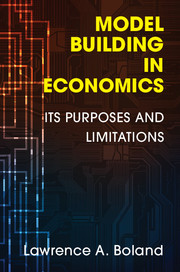Book contents
- Frontmatter
- Dedication
- Contents
- Preface
- Acknowledgements
- Prologue: Model building yesterday versus today
- Part I Theoretical Models
- 1 Microeconomic versus macroeconomic theoretical model building
- 2 On the limitations of equilibrium models in general
- 3 On building theoretical models using game theory
- 4 On the purpose and limitations of game-theoretic models
- Part II Empirical Models
- Part III Testing and Models
- Part IV Methodological Considerations
- Bibliography
- Name index
- Subject index
4 - On the purpose and limitations of game-theoretic models
Published online by Cambridge University Press: 05 October 2014
- Frontmatter
- Dedication
- Contents
- Preface
- Acknowledgements
- Prologue: Model building yesterday versus today
- Part I Theoretical Models
- 1 Microeconomic versus macroeconomic theoretical model building
- 2 On the limitations of equilibrium models in general
- 3 On building theoretical models using game theory
- 4 On the purpose and limitations of game-theoretic models
- Part II Empirical Models
- Part III Testing and Models
- Part IV Methodological Considerations
- Bibliography
- Name index
- Subject index
Summary
Harsanyi and Selten [1988] embarked on a project to find conditions that would plausibly select a unique noncooperative equilibrium point to be the solution to any matrix game. Central to this approach was the acceptance of … [John] Nash’s [1951] formal concept of a noncooperative equilibrium as the central necessary property of any solution.
The viewpoint espoused here is that the search for a unique noncooperative equilibrium solution to all games poses many interesting philosophical problems in an abstract world inhabited by abstract von Neumann game players with unlimited intelligence and perception and no passions or personality traits. These players act in an institution free world where context is implicitly accounted for in the matrix game or the extensive form of the game. Unfortunately, as a portrayal of human decision-making it fails to appreciate the fundamental limitations in attempting to portray an open evolving system where the dynamics are context dependent and the institutions of any society are the carriers of process.
Martin Shubik [2012, p. 2]The obstacle facing anyone who wishes to discuss any limitations of using game theory to build economic models or even criticize game theory or game-theoretic models is the bifurcation of the proponents. On the one hand, we have the economists who are building game-theoretic models in the hopes that they can overcome one of the short-comings of both Marshallian partial-equilibrium analysis, which looks only at the behaviour of singular, price-taking individuals who are just minding their own business, and those who complain about Walrasian general-equilibrium models, which do not recognize the diversity in an economy or the interaction between individuals beyond buying and selling in the markets. On the other hand, we have the mathematics-oriented game theorists who lead the way in game-theoretic analysis and who, regardless of realism, are willing to assume anything that helps them construct their proofs or find solutions for their equilibrium models. Most of the critical questions I discussed at the end of Chapter 3 are the result of these mathematics-oriented assumptions. This chapter will focus on whether the mathematical devices and assumptions that have been invented to answer those questions are as useful as game theorists think or as limited as some critical economic model builders think.
- Type
- Chapter
- Information
- Model Building in EconomicsIts Purposes and Limitations, pp. 78 - 94Publisher: Cambridge University PressPrint publication year: 2014



